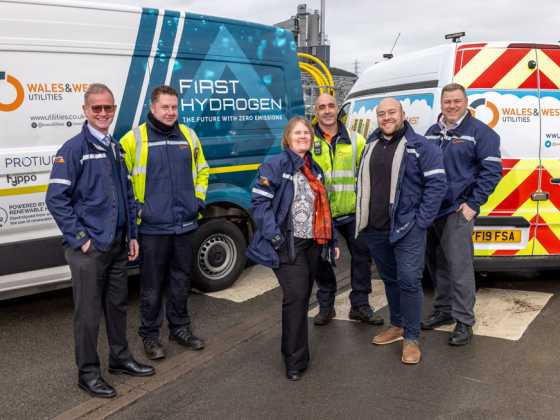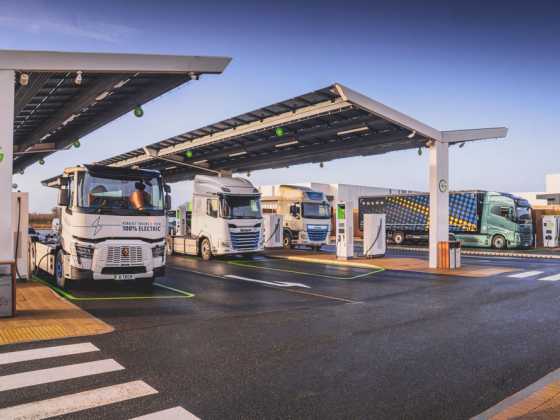A glimpse into the industry
Robin Dickeson, of the Society of Motor Manufacturers and Traders looks at what factors have affected the UK van and truck market in the past, and how it will look beyond 2010
 In the few years before the recession bit, van sales in the UK grew almost explosively, reaching record levels. Those sales rose from around 100,000 a year to 330,000 a year in the last 15 years.
In the few years before the recession bit, van sales in the UK grew almost explosively, reaching record levels. Those sales rose from around 100,000 a year to 330,000 a year in the last 15 years.
That growth was driven by a range of factors with internet shopping and home deliveries playing a big part. Also, businesses increasingly used vans to deliver services, from double glazing to landscape gardening, across ever greater distances. Now, roughly half the nation’s vans carry freight and half are more or less mobile workshops, typically helping tradesmen do their jobs.
Truck and trailer sales rose too, but more gradually; demand for transport rose fast as its relative cost fell, but increasing efficiency meant that effectively, each truck carried more goods faster and further. The UK’s truck fleet is virtually the same size now as it was in the 1950s; today’s trucks just do a lot more.
Incidentally the nation’s car fleet has grown from about two to 27 million in the same period, which helps to explain where congestion comes from.
As van sales started to reach those record numbers, bureaucrats started to reach for the rule books. The van fleet had poked a collective head above the parapet and people noticed. Mostly they seemed to notice vans at 90mph in the fast lane on motorways.
The impact of the recession
Then the recession bit and everything changed. And importantly, it isn’t only the numbers that are different.
We started to hear people worry about vans, their emissions, safety, driver training and similar. That chorus grew quietly at first and will grow some more, both in the UK and on the mainland.
Already we’ve seen draft CO2 limits for vans and can expect more “legislative intrusion”, as one pundit put it. That may mean active and passive safety systems, including speed limiters and perhaps axle weight indicators and even tachographs to record van driving hours. New laws will drive some of these changes, but lawyers and insurance firms and their fear of exposure to public and employee liability claims will drive others.
From that peak rate of over 330,000 a year in the spring of 2008, van sales dropped 35 per cent to 186,000 by the end of 2009.
The scrappage scheme that did so much for car sales did little for vans and, as it didn’t apply to them. It did nothing for trucks and trailers. But its effect on consumer and business confidence probably has helped, if indirectly.
We’ve lost haulage firms, van and truck dealers, bodybuilders, trailer makers and many of the supporting businesses as the recession accelerated the pace of change. Sadly, lots of people have lost jobs as firms fail or fall prey to ‘consolidation.’
Present
Early figures suggest the UK is technically out of the recession, with its economy growing 0.1 per cent in the last quarter of last year. That minimal growth is welcome but uneven; many sectors are still struggling.
The general recovery prospects look patchy; some sectors will do well, we’re not likely to stop eating for instance and more people have eaten out than expected. And London’s West End theatres just reported record audiences and revenues for the end of last year.
But for others the prospects are still quite poor. For instance, the construction industry’s output is 15 per cent down on its peak in 2007. Commentators say that by 2011 it will have fired nearly 400,000 people and may hire only 100,000 over the next five years, as it recovers.
In one of his recent and weekly economic reviews for members, Robert Baker, chief economist at the Society of Motor Manufacturers and Traders says the labour market is divided, with a strong contrast is between the public and private sectors; no growth in the private sector contrasting with growth above 3.5 per cent the public sector.
On jobs, the public sector total at September 2009 was 6.09 million, up five per cent on the previous year. In the private sector it was 22.8 million, down three per cent.
“Past experience after such major drops in demand show that both vans and trucks may be calmed for some time before recovery takes hold,” says Baker. Recovery in demand in large fleets, the leasing sector and large freight transport-dependent businesses demand is vital.
“In the construction sector and across the smaller-business sectors too, firms will need to see a sustained rise in activity if they are to be confident enough to reinvest in new vehicles.”
The general recovery prospects look regionally patchy too. The North West, North East and Midlands have been hit hard, while the best recovery prospects seem to be in the East Midlands, Scotland and Wales.
Registration data
For the commercial vehicle market the overall impression is still ‘the Doldrums.’ Typically van registrations ended the year down 35 per cent, and trucks were down 40 per cent. As the UK, almost alone in Europe fails to register trailers, it isn’t so easy to put figures on that market, but most observers think it is down 60 per cent or more. For all three sectors, order intake is still well down and will show as depressed van and truck registration figures for some months.
Because the time-lag between a vehicle’s sale and its delivery and registration, monthly registration data are a ‘lagging indicator’. Even for cars, it is unusual for a new vehicle to be delivered and registered within a month of its sale. For vans the lead time is often longer and longer still for trucks; two through six months is a reasonable average.
That much missed fact is important. We need to know when people are sufficiently confident to sign a cheque. That is a sale and significant. Delivery and registration data simply confirm that earlier decision and suggest a confidence weeks or months earlier. The ‘lag’ meant that if we’d relied on registration data alone we wouldn’t have seen the start of the recession until months after it had bitten.
Overcapacity in transport
One of the complications for the van, truck and trailer industries is the transport industry’s overcapacity, estimated at around 30 per cent.
Over the last 50 or so years steadily increasing road transport efficiency has helped the industry keep its truck fleet to virtually the same numbers while moving a great deal more freight.
Competition, rising costs and recessions drive efficiency as firms cut costs or face failure. For the transport industry that spare capacity means it could and almost certainly will move more without buying proportionately more vans, trucks and trailers. That has obviously uncomfortable implications for the vehicle makers and their dealers.
While road transport delivers the economy, it is also dependant on it and vehicle makers depend on the industry’s willingness to buy new hardware.
Expect fewer manufacturers as consolidation bites, more shared production arrangements, fewer dealers and more of the financially engineered deals like leasing, contract hire and repair and maintenance schemes. And expect Chinese and Indian firms to take a steadily increasing role.
Future
Renewed and reliable growth in GDP and business investment and stable financial conditions are crucial to the stability of the UK van, truck and trailer sector and its expected gradual recovery in 2010.
For many small and medium size firms, new vehicle purchases are likely to be discretionary for some time, as firms grapple with slow and uncertain revenue growth, new markets, volatile cost pressures and no real need or appetite to renew or commit to long leases or buying new hardware.
Relatively young and durable van, truck and trailer fleets, the need for ever bigger cost savings and efficiencies and more intensive use of existing vehicles will all dampen demand. But in this process of restructuring there will be opportunities as well as challenges to the established order of vehicle use and supply.
The numbers should slowly start to improve in 2010. But as they emerge from this recession, firms will be more cautious about investment, partly because banks are also much more cautious about anything but bonuses. The business landscape is going to look very different through 2010, 2011 and beyond. Those van, truck and trailer sales are going to look different too.
The recession seems to be ending, to everyone’s relief. But we shouldn’t be surprised; recessions always do end. We’ve been having them, on an off and with increasing regularity since the 17th century. So this recession had to end, because unless it does, we can’t have another.
The next one, if history and several very senior economists are any guide, is due sometime between 2017 and 2020. Will you spot it coming. Will you be ready?
Robin Dickeson has worked in the UK truck and van business for over 40 years. He is now manager, commercial vehicle affairs for the Society of Motor Manufacturers and Traders and also edits Transport News Brief, the SMMT’s free, widely read and highly successful weekly e-mail newsletter.






